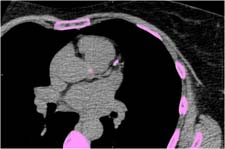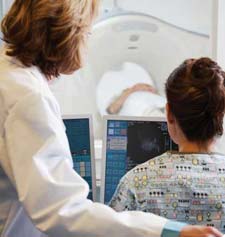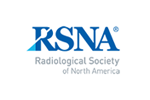Are screening exams worthwhile?
Screening examinations are tests that are performed on a large group of symptom-free people who may have an undetected disease. The goal of screening exams is to discover a disease at an early stage so that it can be successfully treated.
Screening a symptom-free population
- Disease discovery only occurs in a subset of a larger population.
- The benefits of early discovery for the subset must outweigh any potential health risk associated with the screening process of the larger population. Such risks include the radiation risk associated with mammograms for breast cancer screening, and CT used for lung cancer screening.
A screening program must first identify the population at risk for the undetected disease.
Characteristics of the population must be defined:
- By age
- By gender
- By other factors, like ethnicity or family history of the disease
Mammography is an example of a successful screening program for women over the age of 40. This program has resulted in reduced death rates from breast cancer in women. There has been no evidence of any increase in the breast cancer rate due to the low-level exposure to radiation.
Mammography screening works. Could other screening tests work as well? Consider screening examinations for:
- Colon cancer
- Lung cancer
- Calcium-scoring examinations for early detection of heart disease
Computed tomography (CT) screening for colon cancer, called CT colonography (CTC), or virtual colonoscopy, has been gaining attention due to its ability to find early colon cancers. Today's evidence suggests that undetected colon cancer is sufficiently prevalent in the general population to justify screening.
The goal is to discover colon cancer early, when it can be eliminated before it spreads. The American Cancer Society recommends that anyone over the age of 45 at average risk have:
- Flexible sigmoidoscopy every 5 years, or
- Colonoscopy every 10 years, or
- Double-contrast barium enema every 5 years, or
- CT colonography (virtual colonoscopy) every 5 years

CT-calcium scoring
The National Lung Screening Trial found that screening with CT could be beneficial for current and former heavy smokers at high risk for lung cancer. This decade-long clinical trial established low-dose helical CT as the first validated screening test with the potential to reduce mortality due to lung cancer. For more information visit our Chest CT page.
Prostate cancer screening with clinical exam, prostate specific antigen (PSA) blood test or prostate MRI may be beneficial starting at age 50 for men at average risk or age 45 for men at high risk of developing prostate cancer. Prostate MRI can show tumors within the prostate with high resolution and can help patients avoid unnecessary biopsies.
In certain scientific studies, CT is used to look at calcium scoring in the heart. High calcium scores can be a sign of heart disease in people without symptoms. The radiation exposure necessary to perform these exams has gone down markedly with newer CT technologies. Thus, many believe that this examination may benefit people who could be in the early stages of heart disease but show no symptoms.

What about whole-body CT screening of the general public? The benefits do not appear to justify the radiation exposure, at this time. Currently, large numbers of clinical studies are being performed to determine if these or other types of CT screening exams are effective towards improving health. For more information visit our Clinical Trials page.
This page was reviewed on April 25, 2025



